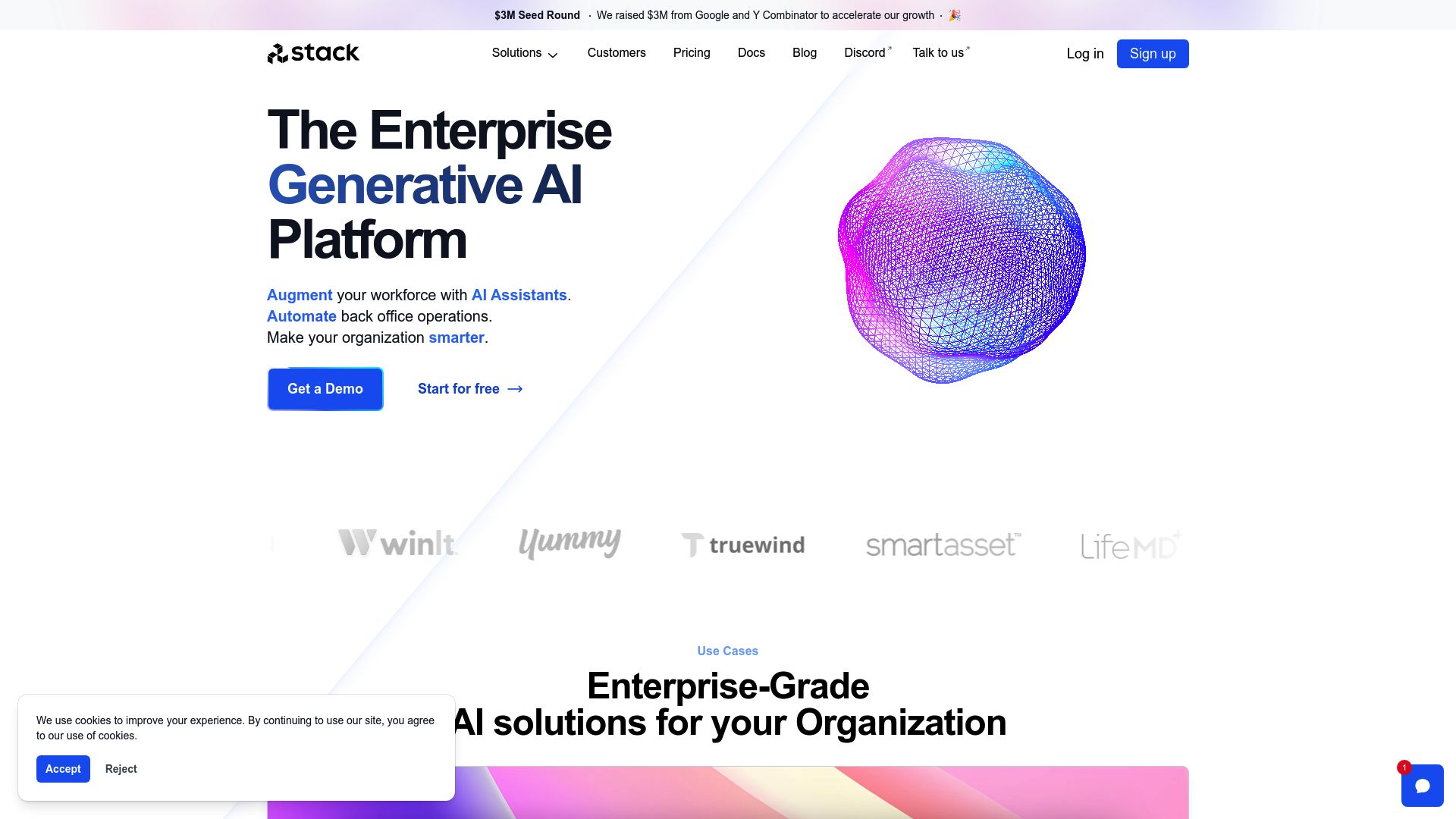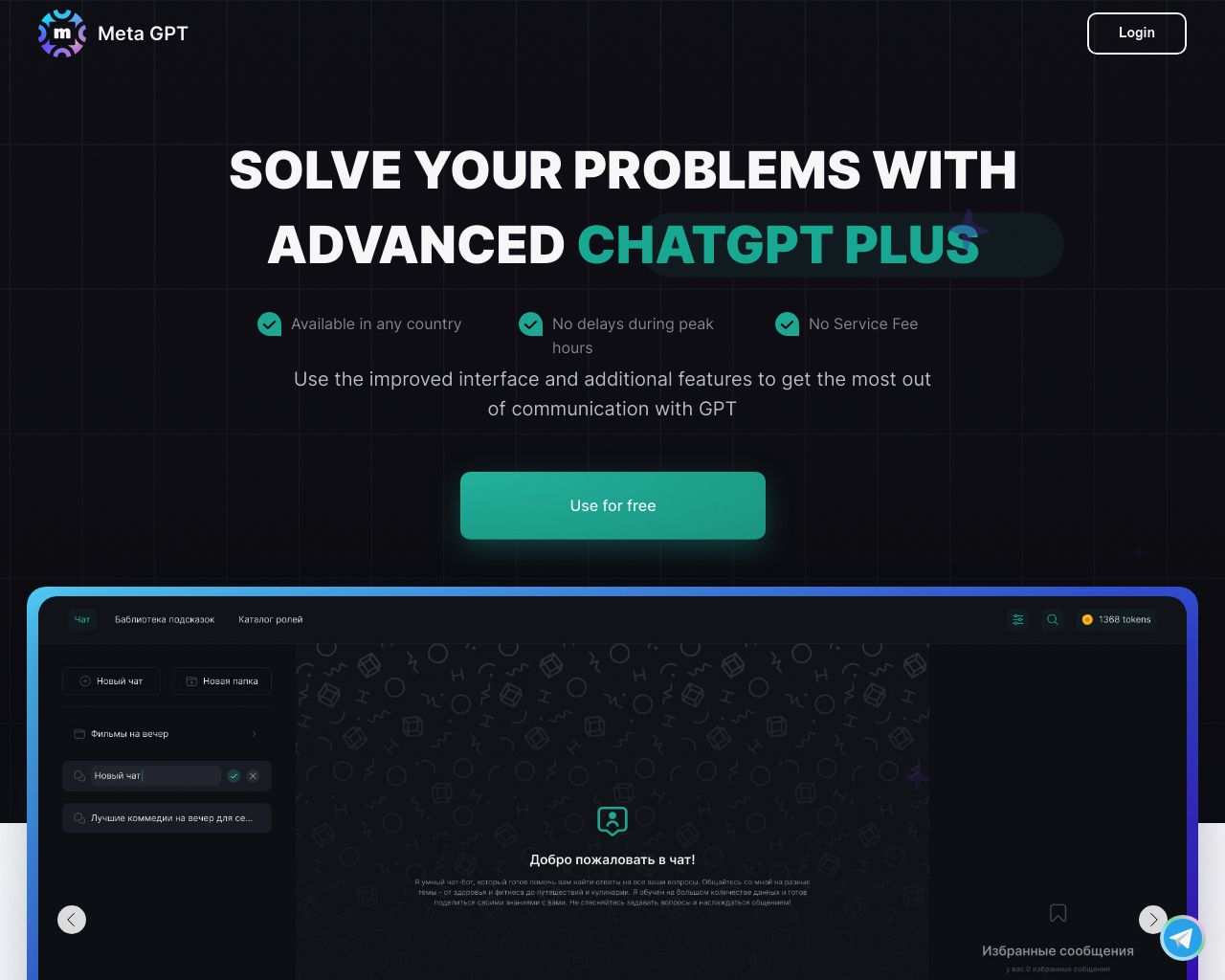Stack AI vs. MetaGPT: Comparing AI Agent Builders
AI-powered agent builders are transforming how businesses leverage artificial intelligence. Stack AI vs. MetaGPT represent two distinct approaches to this rapidly evolving field. Stack AI offers a low-code platform for creating AI workflows, while MetaGPT simulates a software company structure for complex task management. This comparison explores their unique features, strengths, and limitations, alongside SmythOS—a versatile alternative combining powerful capabilities with user-friendly design. Whether you’re a developer seeking advanced AI tools or a business leader aiming to streamline operations, understanding these platforms’ nuances will help you make an informed decision in adopting AI technology for your organization.
Stack AI Overview
Stack AI empowers users to create and deploy AI-driven workflows without extensive coding knowledge. The platform’s low-code interface simplifies the development of custom AI assistants and automation solutions for businesses of all sizes.


Stack AI’s visual builder and pre-built templates accelerate the development process, enabling rapid creation of AI agents for various use cases. The platform supports both development and production environments, facilitating seamless testing and deployment. Its enterprise-grade security features, including SOC 2, HIPAA, and GDPR compliance, ensure data protection and privacy.
Stack AI’s visual builder and pre-built templates accelerate the development process, enabling rapid creation of AI agents for various use cases.
The platform excels in customization, offering deployment options as APIs, webhooks, or site chats. Stack AI integrates with popular services like Google Drive, Salesforce, and Slack, enhancing its utility across diverse business ecosystems. The inclusion of a hosted vector database and support for multiple data formats further expands its capabilities in handling complex data processing tasks.
While Stack AI offers comprehensive features, users may face challenges in scaling complex workflows or implementing highly specialized functionalities. The platform’s pricing structure and potential learning curve for advanced features could pose limitations for smaller businesses or individual developers. Despite these considerations, Stack AI’s combination of accessibility and powerful AI capabilities positions it as a versatile solution for organizations seeking to leverage AI technology in their operations.
MetaGPT Overview
MetaGPT transforms multi-agent collaboration by blending human Standardized Operating Procedures (SOPs) with advanced Large Language Models (LLMs). Developed by researchers from leading institutions, MetaGPT simulates a software company structure to tackle complex tasks efficiently.


MetaGPT assigns distinct roles to AI agents, mirroring a traditional software company. Product managers, architects, engineers, and testers collaborate using SOPs encoded as prompt sequences. This approach, encapsulated in the philosophy “Code = SOP(Team),” enhances output consistency and reliability.
MetaGPT assigns distinct roles to AI agents, mirroring a traditional software company. Product managers, architects, engineers, and testers collaborate using SOPs encoded as prompt sequences.
The platform’s assembly line paradigm breaks complex tasks into manageable subtasks, each handled by specialized agents. This method ensures accurate and robust solutions while generating comprehensive documentation throughout the development process. MetaGPT produces requirement documents, design artifacts, flowcharts, and interface specifications, facilitating better human-AI interaction.
MetaGPT’s unique selling point lies in its ability to mimic and improve human collaboration within an AI framework. By incorporating SOPs and specialized roles, it ensures efficient teamwork among AI agents, producing high-quality outputs aligned with human standards. This approach opens new possibilities for applying AI in complex, real-world scenarios across various domains.
While MetaGPT offers innovative solutions for multi-agent collaboration, users should consider potential limitations. The platform’s complexity may require a learning curve for optimal utilization. Additionally, as an open-source framework, it may lack some of the polished user interfaces and extensive support options found in commercial alternatives. Organizations considering MetaGPT should evaluate their internal expertise and resources for implementation and maintenance.
Feature Comparison
Stack AI and MetaGPT offer distinct approaches to AI agent development, each with its own strengths and limitations. Stack AI provides a low-code visual builder, enabling users to create AI-powered workflows without extensive programming knowledge. Its enterprise-grade security features, including SOC 2 and HIPAA compliance, make it suitable for businesses with stringent data protection requirements. Stack AI also supports multimodal capabilities and integration with popular services like Google Drive and Salesforce.
MetaGPT, on the other hand, takes a unique approach by simulating a software company structure with AI agents assigned specific roles such as product managers, architects, and engineers. This framework excels in tackling complex software development tasks by breaking them down into manageable subtasks handled by specialized agents. MetaGPT generates comprehensive documentation throughout the development process, including requirement documents and design artifacts. However, it may lack some of the polished user interfaces and extensive support options found in commercial alternatives like Stack AI.
While both platforms offer multi-agent collaboration capabilities, SmythOS stands out with its advanced features and flexibility. SmythOS provides a robust drag-and-drop interface for creating complex AI workflows, supports a wide range of AI models, and offers versatile deployment options. Unlike Stack AI and MetaGPT, SmythOS includes a hosted vector database and superior data handling capabilities, making it ideal for organizations dealing with large-scale data processing and analysis. Additionally, SmythOS’s constrained alignment features and comprehensive security measures surpass those of both Stack AI and MetaGPT, ensuring AI behavior aligns with organizational goals while maintaining data protection.
Feature Comparison Table
| Stack AI | MetaGPT | SmythOS | |
|---|---|---|---|
| CORE FEATURES | |||
| Visual Builder | ✅ | ❌ | ✅ |
| No-Code Options | ✅ | ❌ | ✅ |
| SECURITY | |||
| Constrained Alignment | ❌ | ✅ | ✅ |
| IP Control | ❌ | ❌ | ✅ |
| COMPONENTS | |||
| Huggingface AIs | ❌ | ✅ | ✅ |
| Data Lakes | ✅ | ❌ | ✅ |
| DEPLOYMENT OPTIONS (EMBODIMENTS) | |||
| Staging Domains | ✅ | ❌ | ✅ |
| Deploy as Scheduled Agent | ❌ | ✅ | ✅ |
| DATA LAKE SUPPORT | |||
| Hosted Vector Database | ✅ | ❌ | ✅ |
| Sitemap Crawler | ❌ | ❌ | ✅ |
| YouTube Transcript Crawler | ❌ | ❌ | ✅ |
Best Alternative to Stack AI and MetaGPT
SmythOS emerges as the superior alternative to Stack AI and MetaGPT, offering a comprehensive platform for AI agent development and deployment. We combine the accessibility of low-code solutions with the power of advanced AI capabilities, making it an ideal choice for businesses and developers alike.
Our drag-and-drop interface surpasses Stack AI’s visual builder, allowing users to create complex AI workflows without extensive coding knowledge. Unlike MetaGPT’s focus on simulating software company structures, SmythOS provides a versatile environment for building AI agents that can be deployed across various platforms and use cases.
SmythOS excels in its extensive integration ecosystem, supporting a wide range of AI models, APIs, and tools. This flexibility ensures seamless incorporation into existing workflows…
SmythOS excels in its extensive integration ecosystem, supporting a wide range of AI models, APIs, and tools. This flexibility ensures seamless incorporation into existing workflows, surpassing both Stack AI and MetaGPT in adaptability. Our pre-built API integrations and templates significantly reduce setup time, allowing users to focus on innovation rather than implementation details.
Security and scalability set SmythOS apart from its competitors. We offer enterprise-grade security features, including data encryption and OAuth support, addressing the stringent requirements of businesses handling sensitive information. Our platform’s scalability ensures that AI solutions can grow with your organization’s needs, a critical factor often overlooked by other platforms.
SmythOS revolutionizes AI agent development by making it 99% faster and more accessible. Our comprehensive feature set, including multimodal capabilities, problem-solving tools, and advanced deployment options, positions SmythOS as the go-to platform for unleashing the full potential of AI across industries. By choosing SmythOS, users gain a powerful ally in driving innovation and efficiency in their AI initiatives.
Conclusion
Stack AI and MetaGPT offer unique approaches to AI development, each with distinct strengths. Stack AI’s low-code platform and enterprise-grade security make it appealing for businesses seeking quick AI implementation. MetaGPT’s innovative multi-agent collaboration simulates a software company structure, excelling in complex task management.
However, SmythOS emerges as the superior choice, combining the best of both worlds and offering additional advanced features. Our drag-and-drop interface rivals Stack AI’s ease of use while providing the collaborative power of MetaGPT’s multi-agent system. SmythOS supports a wider range of AI models and offers more versatile deployment options, from APIs to chatbots and scheduled agents.
Unlike its competitors, SmythOS includes a hosted vector database and superior data handling capabilities, making it ideal for large-scale data processing. Our platform’s constrained alignment features and comprehensive security measures ensure AI behavior aligns with organizational goals while maintaining robust data protection.
Explore our diverse range of AI-powered agent templates to jumpstart your AI journey. Whether you’re a developer, business leader, or AI enthusiast, SmythOS provides the tools and flexibility to create, deploy, and manage AI agents efficiently. Create a free SmythOS account today and experience the future of AI development—no coding required. Transform your workflow with intelligent agents and unlock the full potential of AI for your business.
Last updated:
Disclaimer: The information presented in this article is for general informational purposes only and is provided as is. While we strive to keep the content up-to-date and accurate, we make no representations or warranties of any kind, express or implied, about the completeness, accuracy, reliability, suitability, or availability of the information contained in this article.
Any reliance you place on such information is strictly at your own risk. We reserve the right to make additions, deletions, or modifications to the contents of this article at any time without prior notice.
In no event will we be liable for any loss or damage including without limitation, indirect or consequential loss or damage, or any loss or damage whatsoever arising from loss of data, profits, or any other loss not specified herein arising out of, or in connection with, the use of this article.
Despite our best efforts, this article may contain oversights, errors, or omissions. If you notice any inaccuracies or have concerns about the content, please report them through our content feedback form. Your input helps us maintain the quality and reliability of our information.
